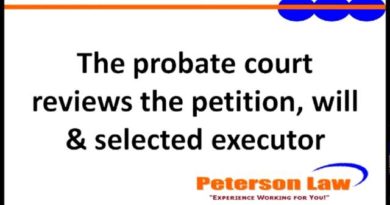Can an Estate Plan Completely Eliminate Estate and Inheritance Taxes?
Tax avoidance is a common, and important, estate planning goal for many people. If you have not considered the need to plan for the impact of estate and inheritance taxes within your estate plan, there is no time like the present to do so. With that in mind, the Indianapolis estate planning attorneys at Frank & Kraft discuss estate planning tools and strategies that can help you eliminate estate and inheritance taxes.
What Are Estate Taxes?
When you die you will leave behind an estate that includes money, property, and other assets you owned at the time of your death. The federal government imposes a gift and estate tax on your estate at the rate of 40 percent. The tax applies to the value of the assets in your estate plus the value of all qualifying gifts you made during your lifetime. Although Indiana does not collect an estate tax, some states also impose an estate tax on the estate of a decedent. Fortunately, you can take advantage of the “lifetime exemption” to immediately reduce your estate’s exposure to federal gift and estate taxes. As of 2023, the lifetime exemption limit is $12.92 million but is set to revert to a much smaller amount in 2026. The current lifetime exemption is deducted from your taxable estate to arrive at your estate’s taxable value.
What Are Inheritance Taxes?
Inheritance taxes are imposed on the value of an inheritance received by an individual or other beneficiary. While your estate is responsible for paying gift and estate taxes due prior to distributing estate assets, the beneficiary of those assets is responsible for paying inheritance taxes if applicable. Indiana does not collect inheritance taxes; however, if any of your beneficiaries live in a state that does impose an inheritance tax it will diminish the value of the inheritance. Because you have no way of knowing where a beneficiary will live at the time of your death, you should consider the potential impact of inheritance taxes when creating your estate plan.
Strategies to Help Eliminate Estate and Inheritance Taxes
Both estate and inheritance taxes can significantly diminish the value of the inheritances you leave to loved ones. If your estate owes gift and estate taxes, that tax bill takes priority over the gifts you made to loved ones in your estate plan. Consequently, your intended beneficiaries might receive less or might not receive an inheritance at all if your estate owes taxes. Likewise, an inheritance tax can make seemingly equal gifts unequal if one beneficiary must pay taxes on the inheritance. Fortunately, a well drafted estate plan can help you reduce, if not completely eliminate, estate and inheritance taxes.
One useful tool when trying to eliminate estate and inheritance taxes is the yearly exclusion. The yearly exclusion allows each taxpayer to make gifts valued up to the current limit ($17,000 as of 2023) to an unlimited number of beneficiaries each year tax-free and without impacting the taxpayer’s lifetime exemption limit. In just ten years, you could effectively shield $170,000 from estate taxes by making yearly gifts to a single beneficiary. Making gifts to multiple beneficiaries allows you to pass down even more assets tax-free.
Along with the yearly exclusion, there are several trusts that can be used to help eliminate estate and inheritance taxes by removing the assets from your taxable estate and/or preventing the assets from becoming part of a beneficiary’s taxable inheritance.
The key to eliminating estate and inheritance taxes is to start early and work closely with an experienced estate planning attorney to incorporate tax avoidance tools and strategies into your comprehensive estate plan.
Contact Indianapolis Estate Planning Attorneys
For more information, please join us for an upcoming FREE seminar. If you have additional questions or concerns about how to eliminate estate and inheritance taxes, contact the experienced Indianapolis estate planning attorneys at Frank & Kraft by calling (317) 684-1100 to schedule an appointment.
Paul Kraft is Co-Founder and the senior Principal of Frank & Kraft, one of the leading law firms in Indiana in the area of estate planning as well as business and tax planning.
Mr. Kraft assists clients primarily in the areas of estate planning and administration, Medicaid planning, federal and state taxation, real estate and corporate law, bringing the added perspective of an accounting background to his work.
Latest posts by Paul A. Kraft, Estate Planning Attorney (see all)






